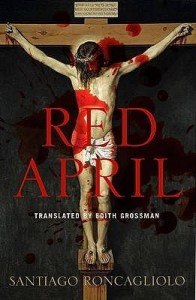 Title: Red April (Goodreads)
Title: Red April (Goodreads)
Author: Santiago Roncagliolo
Translator: Edith Grossman
Narrator: Jonathan Keeble
Published: Atlantic Books, 2011
Pages: 288
Genres: Crime, Thriller
My Copy: Audiobook
Buy: Amazon, Book Depository, Kindle (or visit your local Indie bookstore)
Associate District Prosecutor Felix Chacaltana Saldivar does everything by-the-book, he is organised and knowledgeable on the laws of the land but this tends to rub people the wrong way. When a body is found burnt beyond recognition, Chacaltana’s life is never going to be the same. The investigation into this unique murder leads the associate District Prosecutor to question the choices the government are making. Set during Holy Week in Peru, Red April is a chilling political thriller that explores a twisted murder and a morally bankrupt government.
Red April takes place during Lent 2000, mainly in the Peruvian city of Ayacucho and follows a methodical prosecutor as he investigates a bizarre crime. These were the final days of Alberto Fujimori who vacated the presidency and fled the country in November 2000 due to a major corruption scandal and allegations of human rights violations. When Fujimori came to power in 1990, Peru was dominated by two terrorist organisations, the Maoist group Sendero Luminoso and the Marxist-Leninist organisations known as Túpac Amaru Revolutionary Movement (MRTA). It was not until about 1997 when most of this internal conflict resolved, but this was achieved by the Grupo Colina, which was a death squad made up of members of the Peruvian Armed Forces.
Set in the early 2000s, this novel explores that period of time where people loved Alberto Fujimori for making them feel safe but corruption is becoming a big problem. Even the main protagonist struggled with the idea of not supporting the president. Saying something like “the terrorist killed my mother, brother and sister but since the president took office, no one else from my family has been killed. Why would I vote for somebody else?” This hold on the past is something that runs strong throughout the novel, particularly with Associate District Prosecutor Felix Chacaltana Saldivar who holds on to the memory of his mother. The book is set during Lent and then Holy Week which is a time of reflection and to remember the past, when Christ died for the sins of the world.
Peru is a very religious country, in the 2007 census only 2.9% identified as non-religious, with 81.3% claiming to be Roman Catholic. The Catholic Church is a very important part of the country, even Article 50 of its constitution states that “[the Church is] an important element in the historical, cultural, and moral development of the nation.” The city of Ayacucho, in which the majority of this novel is set. lays claim to 33 Catholic Churches (one for every year of Jesus’ life) and hosts a large religious celebration during Holy Week every year. When reading Red April you quickly learn just how important religion is to the Peruvian people and the plot of the novel.
One of the things that fascinated me about Red April is the culture depicted within the book. Santiago Roncagliolo did not shy away from depicting the dark themes or the problematic political situation that Peru faces. He questions the counter-terrorism strategies of the Fujimori government but also depicts the overall sense of relief that the people had when terrorist organisations were dealt with. The corrupt government and the bureaucratic nightmare that Felix lived through all gave a sense of the political landscape. The Associate District Prosecutor did everything to the letter of the law, including sending rapists to prison; however this made him an outcast, even the rape victims got angry that they were unable to marry their attackers and get their reputation intact.
One reason I read a lot of translated fiction is because I find it interesting to explore different cultures and worlds. The Peru depicted in Red April is so foreign to me that I could not help but be spellbound by the cultural differences. Red April was the 2011 winner of the International Foreign Fiction Prize (IFFP), a literary award I have started to follow closely now that I read more books in translation. The novel was translated into English by Edith Grossman and is a book that I picked up in order to read more books from South America. I am very glad to have read Red April, not only is it an excellent mystery/thriller but as you can see it was an interesting insight into Peru.











This sounds like a fantastic thriller with a lot of local culture. Those are the best!
They are always interesting to read.